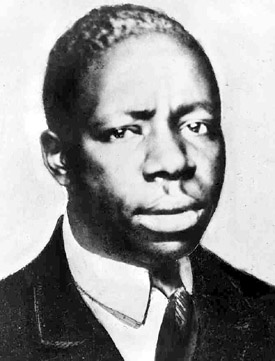George Watson
George Watson (born 1914 in Birmingham - died March 8, 1943 off the coast of New Guinea) was a private in the 2nd Battalion of the 29th Quartermaster Regiment during World War II. He enlisted in the Army in September 1942 and was trained in the Quartermaster Corps. He was stationed on board the Dutch freighter s'Jacob which had been commandeered by the U. S. Army and was shuttling supplies for the construction of an operations base at Oro Bay in Papua New Guinea.
On March 8, 1943 the freighter was attacked and sunk near Porlock Harbor by land-based Japanese fighter planes. Watson, a strong swimmer, helped a dozen or so of his shipmates to a life raft before succumbing to exhaustion and drowning. He was buried at sea.
Watson was awarded the Distinguished Service Cross after the war, the first African-American to be so honored. That medal, and six other Distinguished Service Crosses given to black soldiers, were upgraded to Medals of Honor in a 1997 White House ceremony led by President Clinton intended to correct the prejudicial awarding of honors during and after the war. That same year a transport ship was named for Watson. None of Watson's family were on hand to accept the honors. His widow, Nan Hood Watson, died in 1995. James E. Guilford, Jr of Boston, Massachusetts was one of the men rescued by Watson and has since located Watson's stepdaughter Kay Francis Adams of Cleveland, Ohio, who was five years old when Watson died.
A memorial to Watson has been erected at the Manila American Cemetery in the Phillipines. There is a George Watson Memorial Field at Fort Benning, Georgia. In 2003 a plaque honoring Watson was installed at the Alabama Veterans Memorial Park on I-459. In 2007, Governor Bob Riley designated March 8 as "Pvt. George Watson Day" with a ceremony at the Medical Forum Building in the BJCC. In 2005 the Jefferson County Commission voted to name the new Jefferson County Bessemer Justice Center for Watson. In 2007 that decision was reversed, though the building was still dedicated to his memory and displays a portrait bust by sculptor Branko Medenica.
Citation
Private Watson's Medal of Honor citation reads as follows:
- "For extraordinary heroism in action on 8 March 1943. Private Watson was on board a ship which was attacked and hit by enemy bombers. When the ship was abandoned, Private Watson, instead of seeking to save himself, remained in the water assisting several soldiers who could not swim to reach the safety of the raft. This heroic action, which subsequently cost him his life, resulted in the saving of several of his comrades. Weakened by his exertions, he was dragged down by the suction of the sinking ship and was drowned. Private Watson's extraordinarily valorous actions, daring leadership, and self-sacrificing devotion to his fellow-man exemplify the finest traditions of military service.".
References
- Bryant, Walter (March 9, 2007) "WWII soldier honored for heroism." The Birmingham News
- Guilford, James E. Jr (n. d.) The George Watson Saga. self published
External links
- Private George Watson at pacificwrecks.com
- Wilson, Paul F. (December 14, 2004) George Watson. Find A Grave.
- Wright, Barnett (November 28, 2007) "Jefferson commissioners vote to take name of Army hero off Bessemer courthouse." Birmingham News
